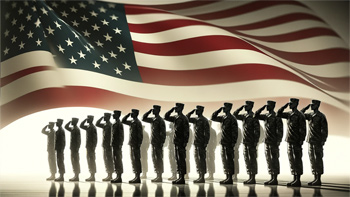 Memorial Day in the United States
Memorial Day in the United States


Memorial Day in the United States is a poignant and significant holiday, observed annually on the last Monday of May. It's a day dedicated to honoring and remembering the brave men and women who have lost their lives in military service to the country. This day of remembrance and respect has deep roots in American history and plays a vital role in the national calendar, serving as a reminder of the sacrifices made for freedom and peace.
The Origins of Memorial Day
The origins of Memorial Day trace back to the aftermath of the Civil War, one of the most devastating conflicts in American history. Initially known as Decoration Day, it began as a tradition of decorating the graves of fallen soldiers with flowers and flags. The first official Decoration Day was observed on May 30, 1868, when General John A. Logan called for a nationwide day of remembrance. Over time, the holiday evolved to become known as Memorial Day, and in 1971, it was officially designated as a federal holiday to be observed on the last Monday in May.
Traditions and Ceremonies
Memorial Day is marked by various traditions and ceremonies across the United States. National cemeteries become the focus of respect and commemoration, with American flags placed on each grave. The National Memorial Day Concert, an annual event held on the West Lawn of the United States Capitol, features music, stories, and tributes to honor the armed forces. Many cities and towns host Memorial Day parades, featuring military personnel and veterans, along with marching bands and service organizations.
Moment of Remembrance
A key tradition on Memorial Day is the national moment of remembrance. At 3:00 PM local time, Americans are encouraged to pause for a moment of silence to remember and honor those who have died in service to the nation. This collective act of remembrance unites the country in a shared moment of gratitude and reflection.
Memorial Day and Its Cultural Significance
Memorial Day holds a profound cultural significance in the United States. It's a day that underscores the cost of freedom and the sacrifices made by service members and their families. Educational programs in schools and community events often focus on the history of Memorial Day and the stories of heroism and sacrifice that define the military history of the United States.
Family and Community Observances
Beyond the solemn ceremonies, Memorial Day is also a time for family and community gatherings. Many people visit cemeteries and memorials to pay their respects, often leaving flowers and flags. Family picnics, barbecues, and outdoor activities are common, reflecting the American spirit of togetherness and resilience. These gatherings serve as an opportunity to educate the younger generation about the values of service and sacrifice.
Memorial Day and the Start of Summer
Memorial Day weekend is often seen as the unofficial start of the summer season in the United States. The holiday weekend is typically associated with outdoor activities such as camping, beach trips, and barbecues. Many communities kick off the summer with festivals, sports events, and family-friendly activities, offering a time of joy and relaxation that contrasts with the day's solemn undertones.
In the United States, Memorial Day is much more than a holiday; it's a day of national unity and reverence. It offers a moment to reflect on the past, appreciate the present, and look forward to the future with a sense of hope and determination. As the nation observes Memorial Day, it reaffirms its commitment to remember and honor the courageous individuals who made the ultimate sacrifice for the country's freedoms and ideals. This day of solemn remembrance and patriotic pride highlights the resilience and strength of the American spirit, continuing to resonate in the hearts of the people.